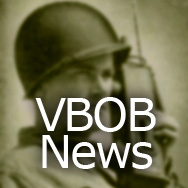When in early 1994, 9th Armored Division veteran Frank Noe presented some of his medals and ribbons, earned during WW2, to a young Luxembourgish boy, no one could imagine how much this small but very meaningful gift would affect the life of that 10 year old child.
This little boy is me, Daniel Reiland, born in 1983 and living in the small town of Huldange, in northern Luxembourg. Before the German army started the Battle of the Bulge on 16th December 1944, Mr Noe’s unit had been staying for several weeks in northern Luxembourg. In the 1980s, on a trip back to the villages and places he had been to during the war, he also came through my hometown and got in touch with my parents, whom since then he visited every time he came back to Luxembourg.
Hearing Mr Noe’s memories about what he and his buddies had to endure during those hard times I was shocked on the one hand that in the peaceful village I was growing up and playing with my friends, only a few decades ago a terrible battle was spreading destruction, agony and death. On the other hand I was amazed that Mr Noe came back to see what the places, he had been to during the war, look nowadays and I was glad to hear that veterans like him get a warm and thankful welcome during their visit. The memories and stories he shared fascinated me in such a way that I wanted to get to know more about that Battle of the Bulge and especially about the men who had to fight it. I started then reading books and publications about the Battle of the Ardennes and the wartime in Luxembourg and became more and more interested in that topic.
At the same time the medals, Mr Noe had presented me, also made me become interested in the daily items the American soldiers were using at that time and so I started collecting all kinds of military uniforms, equipment and items from those days. Touching and looking at those genuine military artefacts helped me getting a more detailed and realistic view of what the daily life of an American Gl must have looked like in 1944 and 1945. At the age of 14, when I started learning English in High School, I was finally able to communicate myself with Mr Noe and another veteran, I got to know by then. Through all my teenage years I was able to share my intense interest for the Battle of the Bulge with a few friends and I went on collecting more military artefacts, which I was often able to still recover or purchase from farms and houses where the actual battle took place at the time.
After I graduated from Police Academy in 2005, I even purchased a restored and running WW2 Willys Jeep, which in a certain way became one of the symbols of the liberation of Europe after the war. The same year I also became a member of the “US Veterans Friends Luxembourg”, a non-profit organization run by volunteers, which helps erecting monuments and organizes ceremonies throughout Luxembourg and tours veterans and their relatives around over here. Especially the annual American-Luxembourgish Friendship Week gave me the opportunity to meet and get in touch with many veterans and their families and people who had lost a relative in Europe during the war.
The memories they shared and the many unanswered questions they often had made me start researching what actually happened to certain soldiers or units on certain dates and with the help of military records from those days and studies on the former battlefields, I was even able to retrace some cases.
Meeting a veteran out on the former battlefield and getting to know his personal story is not only a fascinating but also very meaningful experience to me. I don’t think it is even possible to touch history in a more realistic, genuine and living way. Quite often people ask me why a 28 year old man is so interested about the Battle of the Bulge, collects military artefacts from that period, does research about certain events and helps touring veterans and their families around.
The answers to that question are very simple: First of all the personal encounter with Mr Noe became a strong and lasting experience which made me want to get to know more about him and his comrades. In addition to that I consider it very important to make every possible effort to prevent our common history from being forgotten once the people who were part of it will be gone.
The most important reason however is to thank and honor the returning veterans and their fallen comrades and make sure that their sacrifices, made during the liberation of Luxembourg and the other European countries, were not in vain and will be remembered.
Click on usvf.lu to see our web site
submitted by Clarence Buckman, 106th Infantry Division
